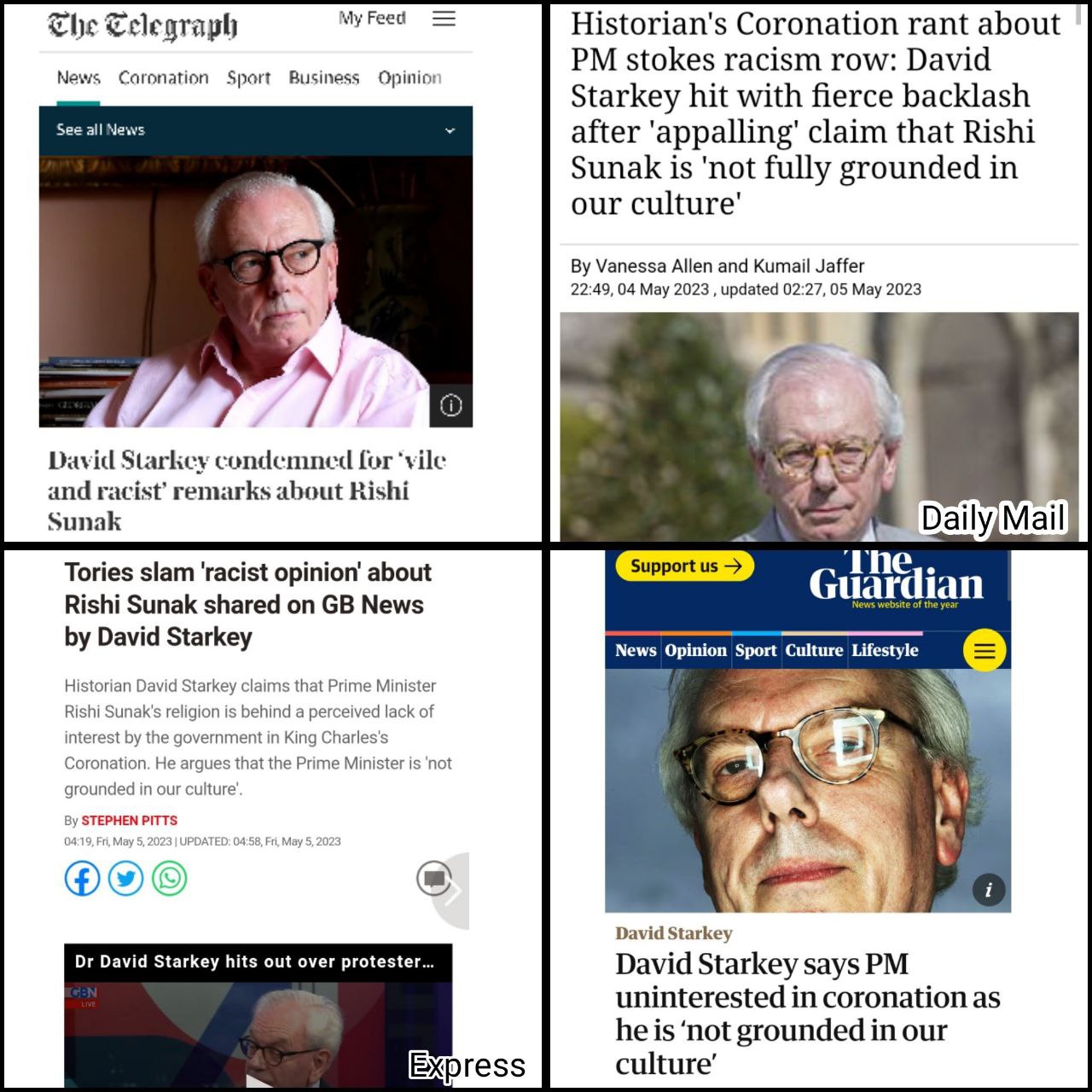Sunak Is "Not Fully Grounded In Our Culture"
by TBG

The recent controversy over a factual statement by the historian David Starkey has given us some insight into modern Britain.
Clip deleted by GBN after minority complaints, when Starkey observed that Sunak is "not fully grounded in our culture".
— TraditionalBritain (@TradBritGroup) May 4, 2023
He has Indian heritage and a background in the US, as well as a British public school patina. Where's the issue with speaking forthrightly? pic.twitter.com/9lwUYqTHxc
In discussing the limp response by government to the impending Coronation of King Charles III, Starkey had said "you have a Prime Minister, I think a man of immense talent, of extraordinary skill, but really not fully grounded in our culture. Now I know that that's a difficult and controversial thing to say, but I think it's true. This Coronation is going to highlight, far too much our differences, rather than what unites us." He goes on to point to the Prime Minister's Hindu religion as one aspect of his claim.
These comments set off something of a firestorm. Kurdish Iraqi origin Conservative MP, Nadhim Zahawi set the general tone, saying "That is an ill-informed opinion. A racist opinion. He only needs to spend a few hours with Rishi or with me in Stratford-on-Avon or Yorkshire to realise how our culture is strong and has been rooted in diversity, pride and love." Another minority politician, former Cabinet minister Shailesh Vara, was found to say "This is an appalling comment and in no way reflects modern Britain."
The supposedly 'right-wing' press quickly circled their reporting wagons, using the headlines of their pieces to instruct their readership on the only opinions that were acceptable on this issue.

Yet in the context of this coronation of a British king, it's clear that this was never an event "rooted in diversity" (Zahawi) or "reflecting modern Britain" (Vara). The first recorded coronation service was in 973 (1,050 years ago), the first occasion at Westminster Abbey was in 1066, (957 years ago). It is a celebration of an event anointing a hierarchical, hereditary monarch over an ancestral people. It is rooted in the pre-modern and pre-democratic and therefore has absolutely nothing to do, historically, with either 'diversity', or modernity.
National Erasure
More insidiously, the response to Starkey's comments provide us the lens through which our political class wishes to present Britain to ancestral British people, with the concept of 'diversity' at the forefront.
Our whole cultural understanding is being rebuilt around the idea that diversity is our highest cultural value, the only permitted way of perceiving Britain. The other side of this is a deconstruction of anything that may compete with or challenge these new conceptions of nationhood and culture.
Sometimes both approaches combine, such as was used in the example of Cheddar Man which was used (STJ) to try to suggest a 'non-white' lineage in Britain, as well as to elevate non-Europeans to a more ancient place in our nation's story. At other times, the Western European peoples who populated Britain are taken as undermining any sense of British identity and wielded as a parallel with the importation of millions of people from outside European living spaces.
The Empire Windrush troop ship in 1948 is then brought in to create a newer mythological foundation story for modern Britain, as the political class work to make our country as superdiverse as possible, before the people can politically rebel. Cherry-picked historical elements from eg. the Roman Empire such as Septimius Severus are combined with the trans-Atlantic slave trade to continue to misrepresent British history to the population and historical dramas are used to falsify British history to the poorly educated or the intellectually deficient.
Britishness
In the context of determining a claim to Britishness or of British culture in relation to Sunak, it's worth taking a moment to decide what we might mean by such terms.
Being 'British' can be categorised as the following:
1. Being of British descent (being related to the historical people of Britain as perhaps outlined by modern DNA tests such as 23andMe or Living DNA)
2. Being a British subject (176,000 awarded in 2022)
3. Culturally British (being a British subject and growing up within the cultural norms of Britain)
4. Historical relatedness and proximity (having an ancestral connection to the people who made British history and culture)
For 74% of the British population (2021 Census) they combine all the above elements in the fullest and most comprehensive sense of British identity, often described as being a 'native Briton' or indigeneity.
As anyone of honest intent can recognise, Sunak fails on at least two of these criteria. His cultural attachments are also complicated by a narrow cultural attachment, both by being of dual heritage (British and Indian), with two children with an Indian woman who is not a British citizen and by being followers of the Hindu religion, with roots outside of European norms.
In this reading therefore, the observation that Sunak is "not fully grounded in our culture" is both a rational and a factual statement. It can only be a negative statement, if such things are taken as being inherently negative, which for many is not the case.
Dual Identities
Government attempts to create what they term a more inclusive British identity focus upon making British institutions more representative for minority peoples. This requires a recognition of their own ethnic dissimilarities to the host population and more visible representations of these groups within forward-facing cultural associations.
From the police to charities to education, ethnically aligned associations have sprung up to represent these groups. Indeed, Nayaz Qazi of the Conservative Friends of India was roped in by the Daily Mail to say this "demonstrates his lack of understanding of what modern Britain and the Commonwealth stand for... it is through the diversity and richness of Britain and the Commonwealth that Britain is recognised worldwide."
Exclusivity
From the foregoing, we can now readily see how the concept of inclusivity is a tool used by governing elites and those they fund in the cultural sphere to deny to British people recognition of their own historical inheritance and birthright. Inclusivity is used to exclude the rights and natural interests of native British peoples.
Associations for ethnic interests are not permitted to British people (point 1.) and any public discussion of the historical aspects of this process, as recognised by Dr. David Starkey, are swiftly howled down. Those outlets who cater to their concerns, such as the 'right-wing' press, owned by globalist plutocrats aligned to multiracial ideology, bar any comments and frame the controversies in ways that are beneficial to the interests of political overlords.
What is To Be Done?
I hope that the discussion here has indicated that we have a problem with how this campaign is being conducted, that works against the natural interests of the British people.
If we decide to accept the foundational myths of diversity as representing modern Britain, then we are ill-equipped to argue against the continued transformation of the country. As outlined earlier, we must either hopelessly plead for individualism, in the face of many activists working through a frame of group identity or we must reject this rendering of our history wholesale and assert our own national ethnic interests. To re-render Lenin's dictum, Who, Whom?
As the (American Jewish) London School of Economics professor, Eric Kaufmann has reasonably said, Self-Interest is not Racism, "We need space for ideas around ethnic interests to be more openly aired without accusations of racism. We believe that pro-immigration groups should accept the importance of cultural concerns."
These self-interests exist, they are based upon fundamental (often veiled) concerns of the deepest kind and we should not allow the dictates of internationalism to sweep British people into the dustbin of history. It is both ethical, reasonable and right that they find their place at the political table. And it is moral cowardice for British people to ignore them, at this stage in our national story.